Nigeria and Cameroon share a long border. In the coastal region, there’s unrest due to anglophone separatists. Further inland, Boko Haram wage their jihad on both sides of the border. Between these crisis zones there’s one semi-open border crossing, high in the mountains. That’s where I was headed.
The first hour of cycling was along the main road to Mayo Darle. It alternated between dirt and tarmac, usually being paved on the steeper parts. When I reached the town, I asked around the customs area if it was possible to get stamped out here. They said that because the border is officially closed, they don’t provide stamps. But I could go to the border anyway.

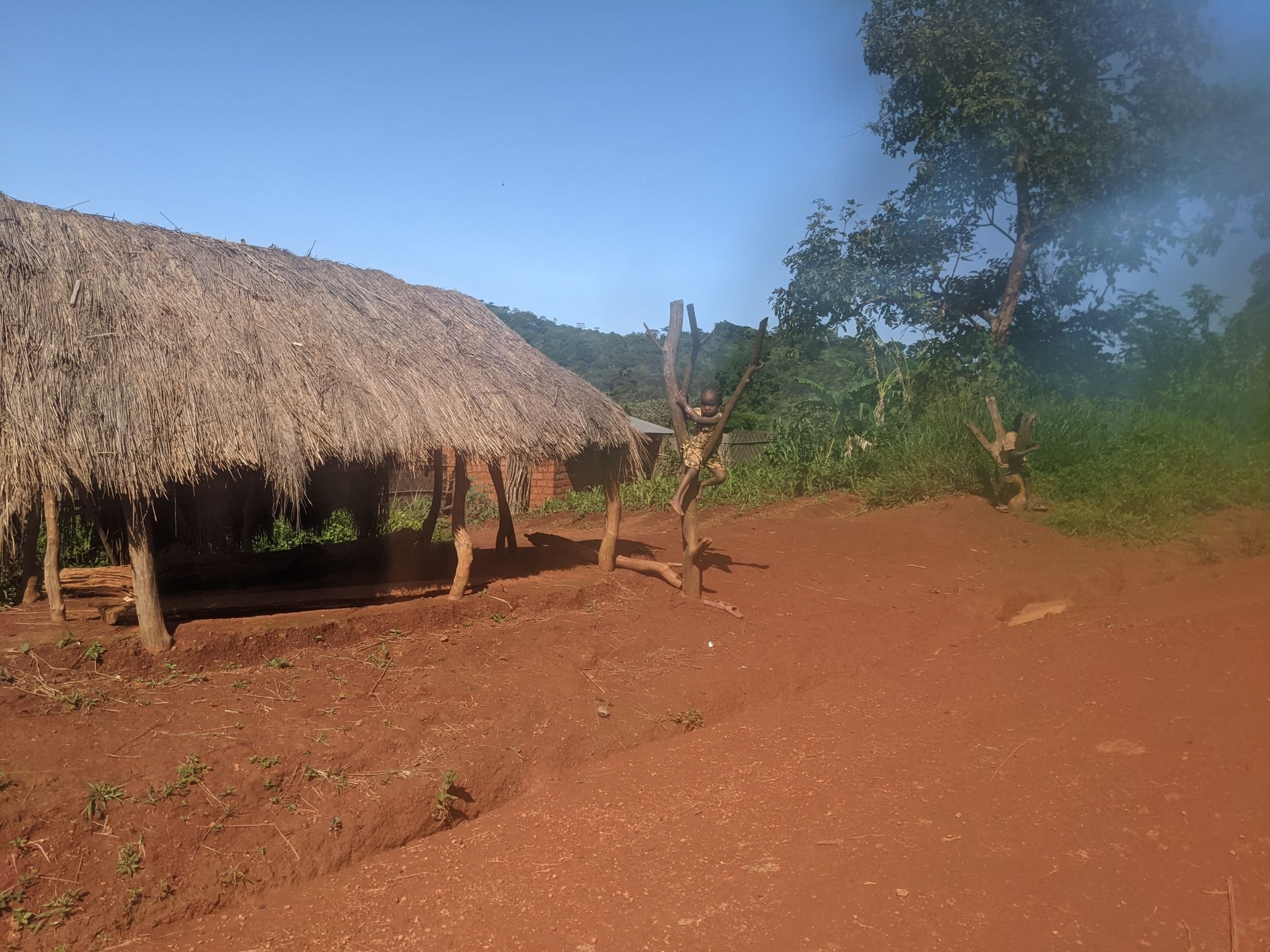
After picking up some motor oil to replenish my chain lube, I headed out on the track to the border. The road was bumpy and hilly, often steeply so. It was an unusually sunny day so the surface was dry, for which I was very glad.
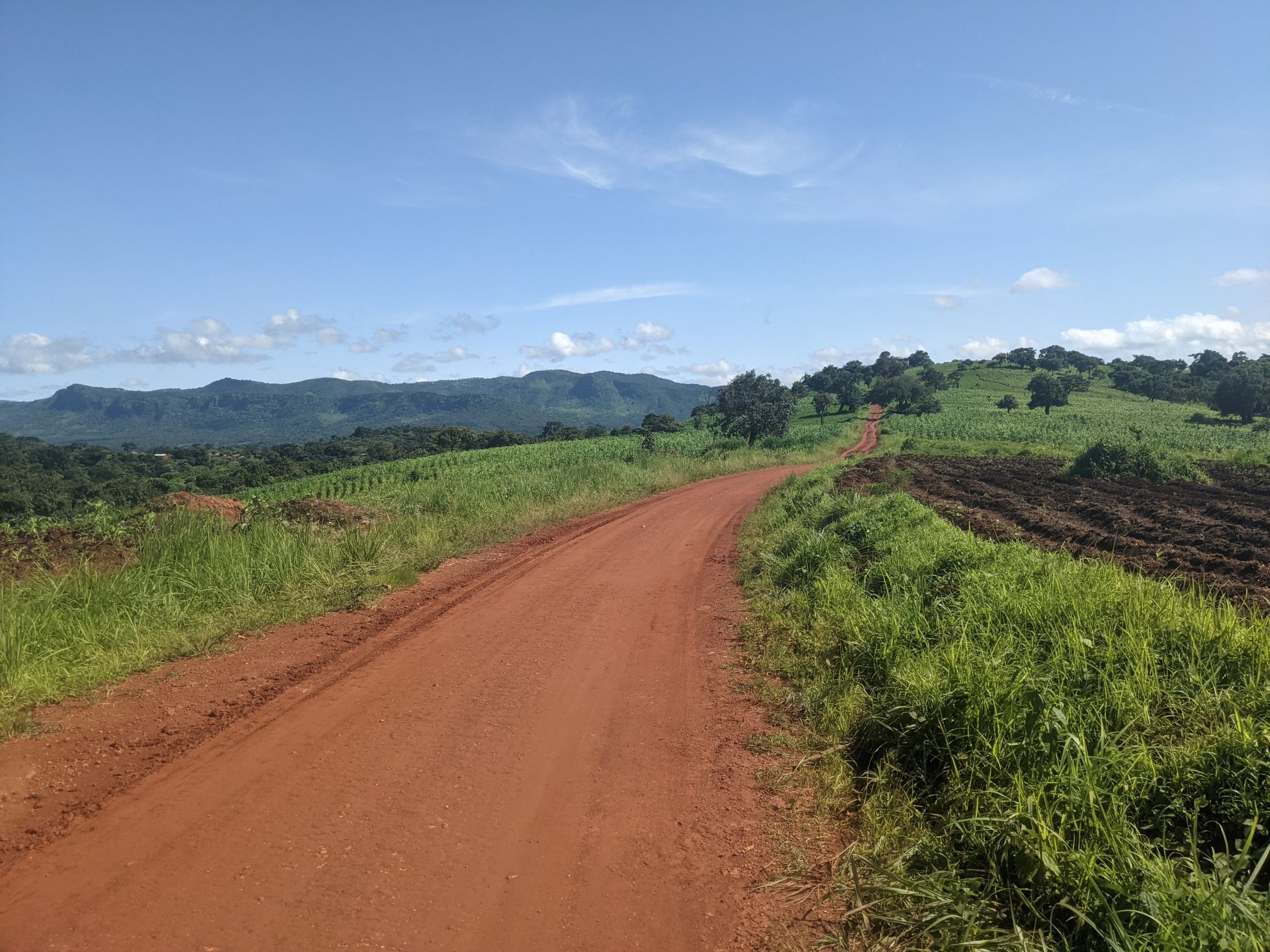

At the border village, Ribao, I asked around for money changers. The guy I was brought to only had about £7 worth of Naira, but that would be enough to make sure I could buy food if needed. On the edge of the village was a roadblock for Cameroonian immigration.
The guy there made a phone call then checked over my passport. He then asked me to leave my phone on my bike, which seemed sketchy. Once I’d done so he said the border was closed. It’s true – but they tend to let people through (certainly there was lots of traffic) and the way he was saying this only after checking my passport and asking me to move my phone away made me suspect he was looking for a bribe.
Fortunately I had a trump card, the Laissez Passer document I’d received while collecting my visa. While collecting that I also brought my phone back and started recording, but he accepted the Laissez Passer and let me go. The document is signed by the ambassador and charges all officials to provide me with whatever assistance I need. Pretty useful document!
From here the road began to climb absurdly steeply. It climbed around 500m, with a 2km stretch that averaged 17%. Added to the poor road surface, that made for quite a bit of pushing. There were quite a few motorbikes going past; one fell off (and was fine) while several lost traction and had to get someone to push while they started up again. I was so glad for the dry weather!
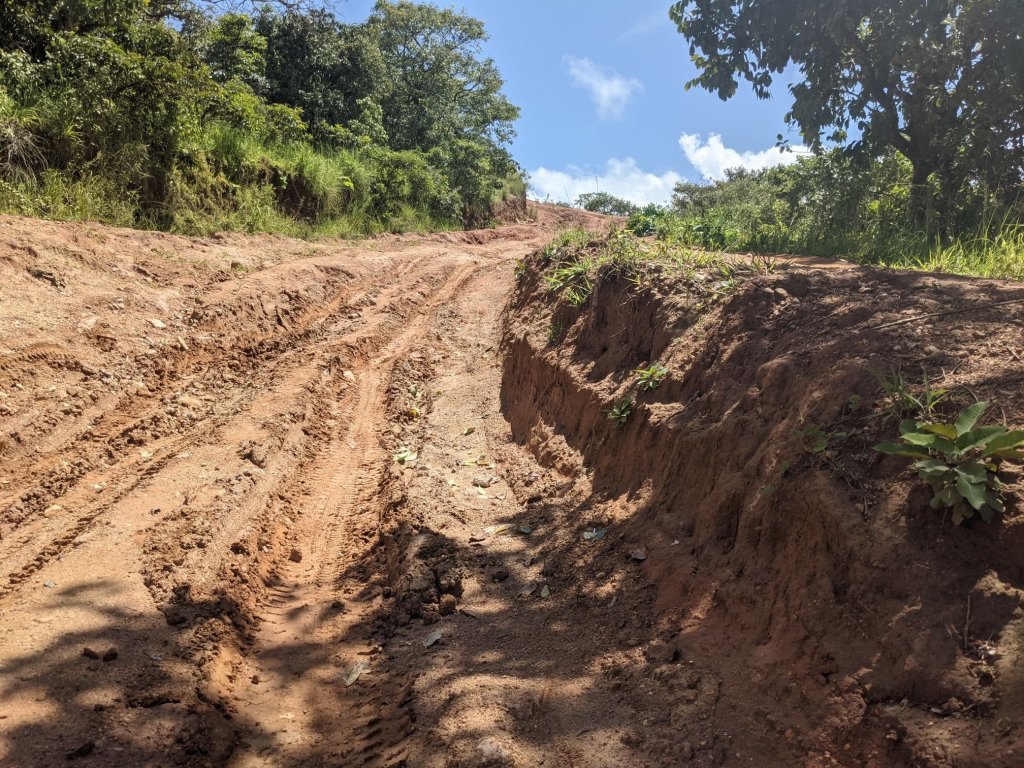


Finally the steepness came to an end and I cycled along, continually climbing or descending along the tops of the mountains.
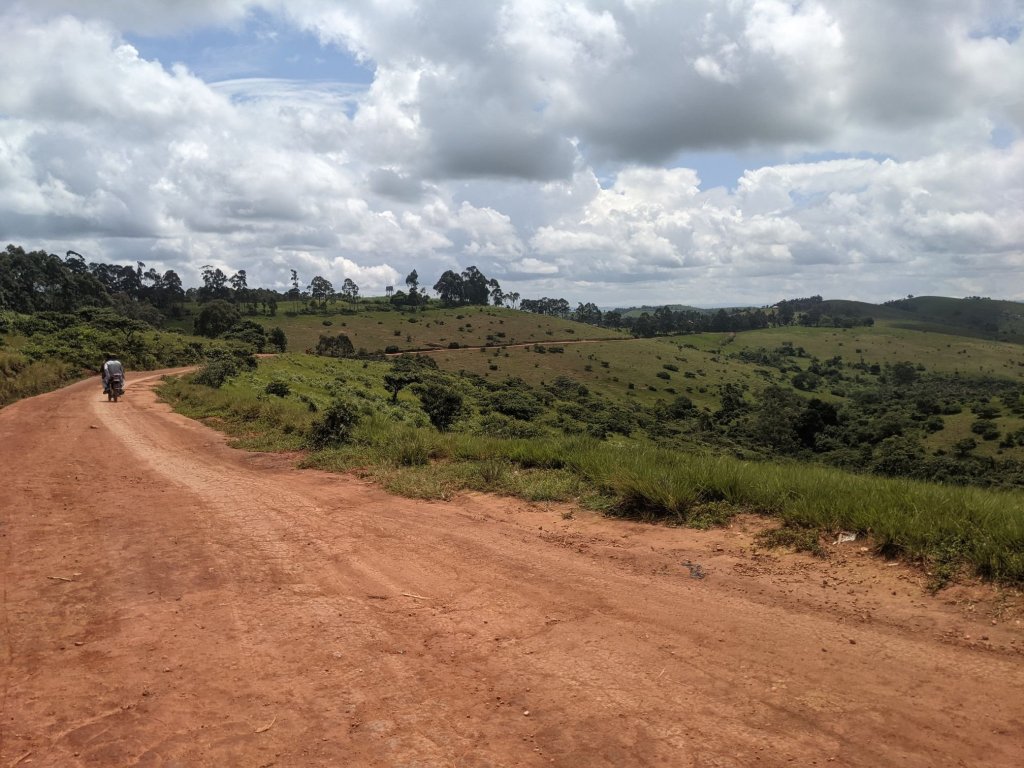
At one point, as I cycled along these green hills, with a bit of a breeze making it slightly cool, it felt almost like being at home in Wales.
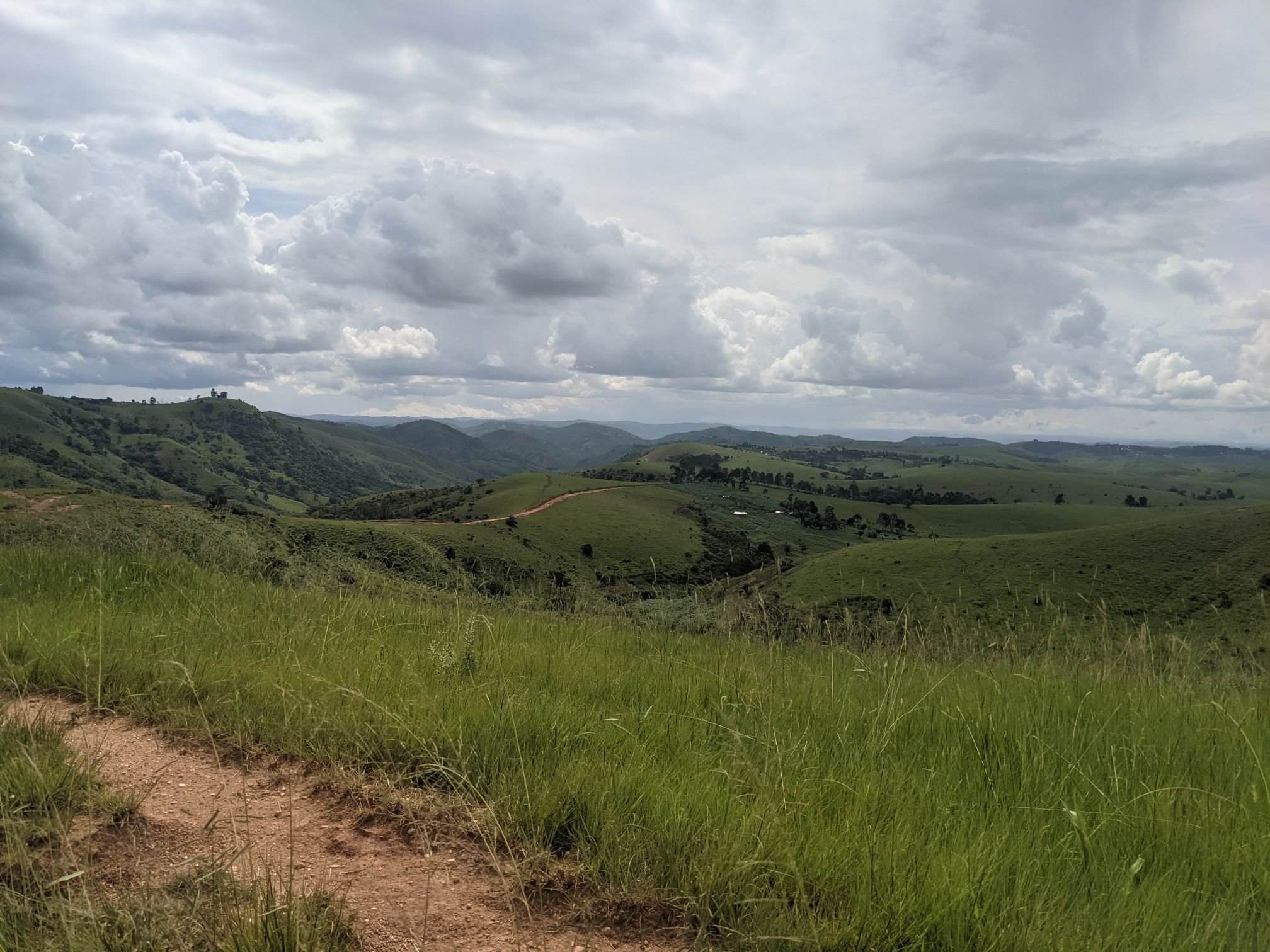
I reached Nigerian immigration. Initially the guy wasn’t happy that I didn’t have a Cameroonian exit stamp. I said it was fine because of the Laissez Passer, which he accepted (though I don’t think he could read French). Then he said he only had a transit stamp, which would only let me stay in the country 7 days. I said that wasn’t enough and he called his boss in the next town who said I could continue and get my stamp there.
There was also a police checkpoint where my details were taken down. He asked for my yellow fever vaccine then said he was going to issue me a fine (bribe). I didn’t understand the first reason he said but the second was for not having a Covid vaccine. I said I wasn’t going to pay and pointed out that he hadn’t asked about a Covid vaccine and showed him my certificate. He let me go.
The next few hours continued as before, going along bumpy road though the beautiful mountains. The only time the road wasn’t bumpy was when it turned to mud instead. On one occasion my front wheel sunk into an unexpectedly deep patch of mud and I went over the handlebars, landing in a handstand while my bike briefly balanced perpendicular to the ground.
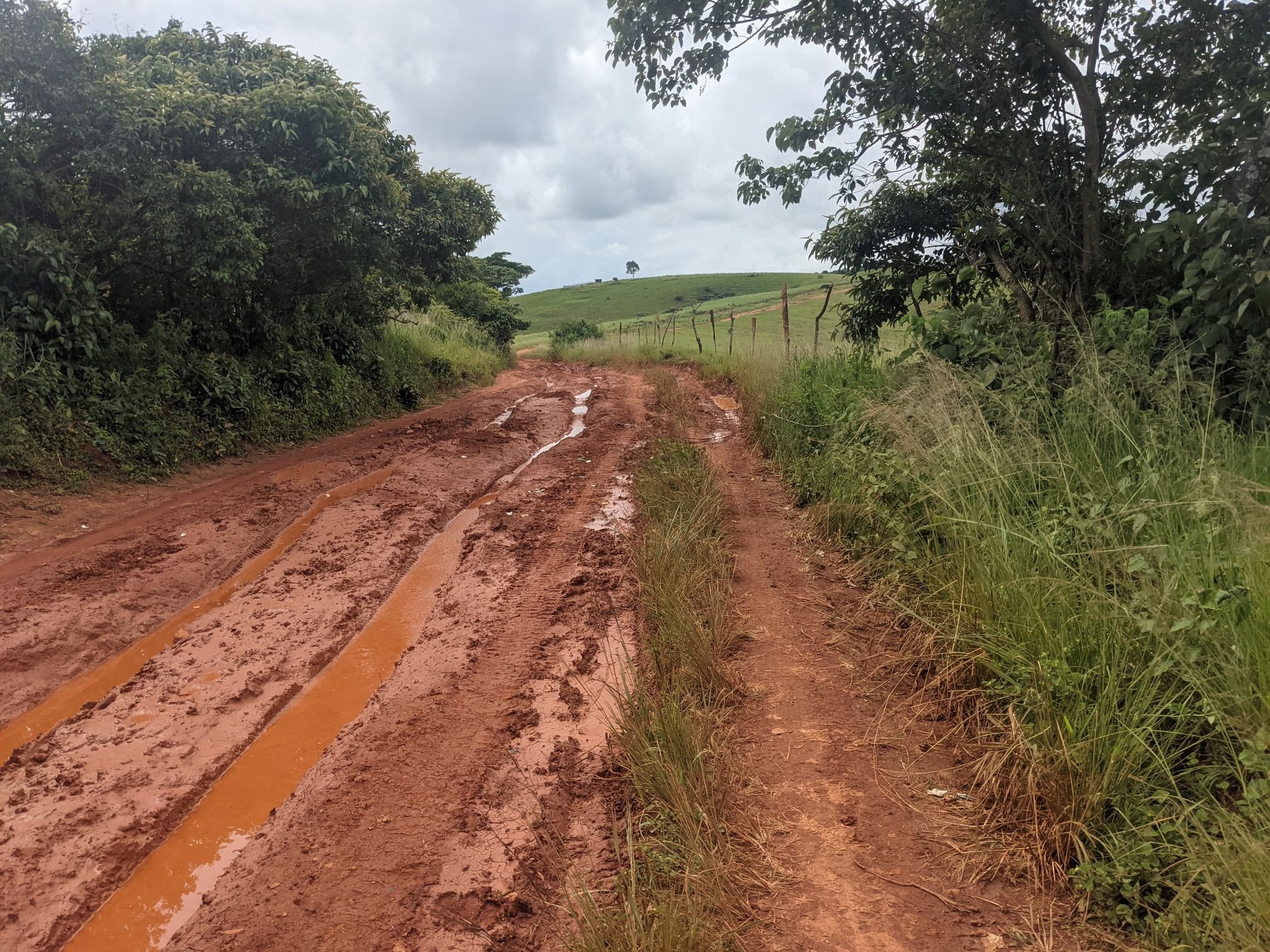
I stopped at a village where I was able to change the rest of my francs into Naira, for a better than market rate. The people there asked for “snapshots” (selfies) which took a little while as everyone wanted a photo. I was stopped at one of the immigration checkpoints on the way out of town. After checking my passport they wanted to write my details into another book, but they let me give them a photocopy and ride on (after some more “snapshots”).

The road descended steeply towards a river.. I was only just comfortable riding down it; I definitely would have been pushing the other way.
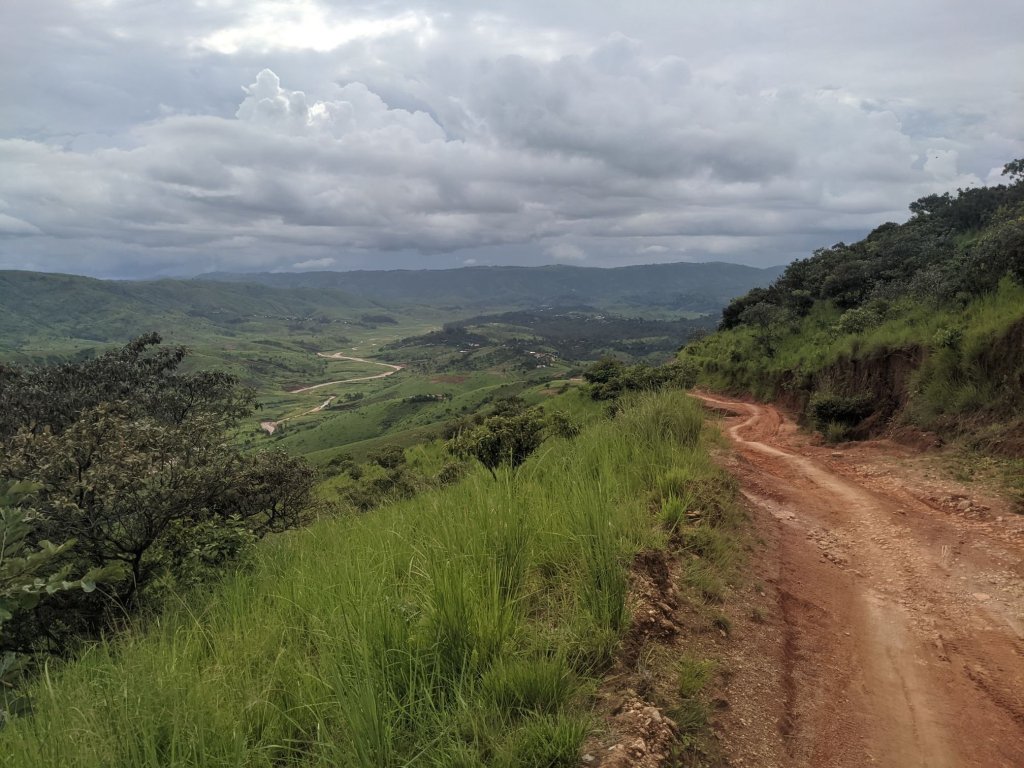
I was taken across the river in a small boat, propelled by a pole, and deposited on a sandbank on the other side.
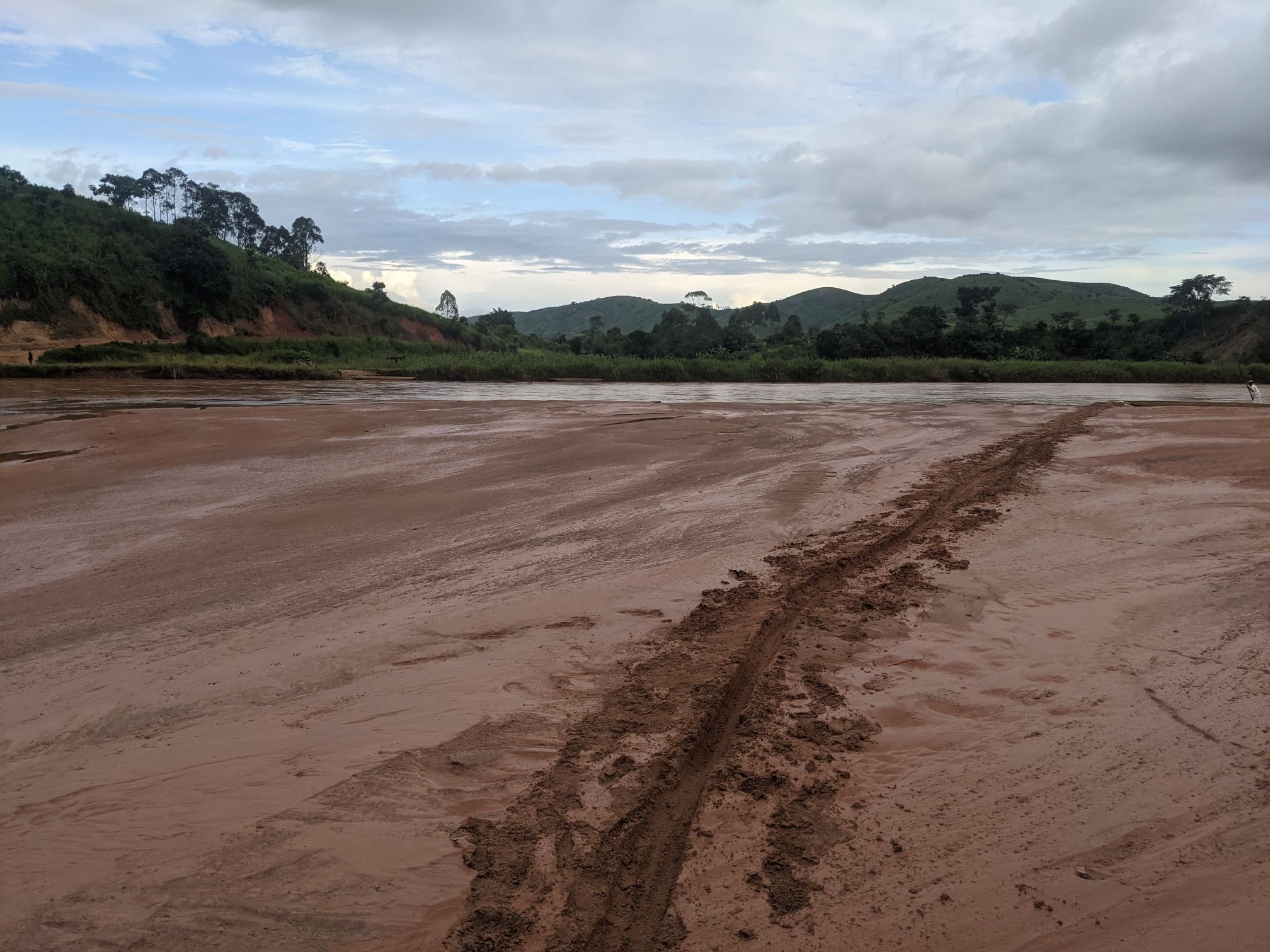
The road climbed back up again. It wasn’t quite as long nor as steep as the earlier ascent but I still pushed a lot of it. Over the space of 2km there were 5 roadblocks. I was allowed through 4 of them but at one the guy tried to get me to stop. I was running out of daylight so I kept going.
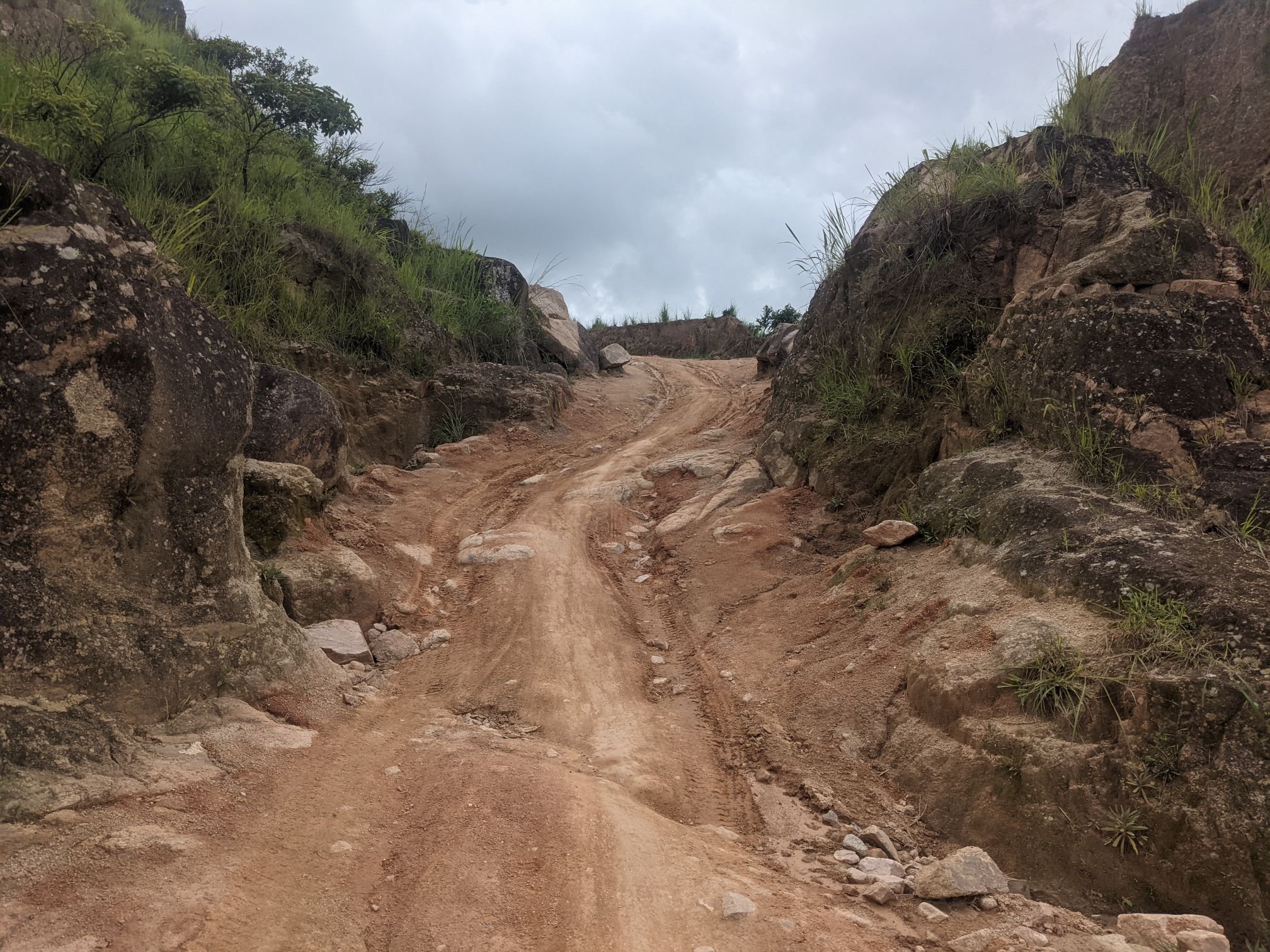
At the top of the climb I entered a forest. The sun was about to set and I still had 5 kilometres to go. Thankfully the road was generally smoother than it had been and I was able to go a bit faster.

It was getting dark when I reached the town of Gembu. This is a fairly large town but the road I came in on was a small track and I ended up with a group of kids following me. I arrived at a hotel and checked in, paying a little extra for a room with a hot shower. It was not quite fully dark when I arrived, but it was close. After just over ten hours moving time I was pretty tired and hungry. The attached restaurant had pictures of all sorts of food so I asked if they had a menu. “No, but I can list the options for you.” “Ok.” “We have rice and stew.” “Ah. Well one portion of rice and stew then please.”
I had decided to stay in hotels every night during my time in Nigeria. This country has a worse reputation for safety than others I’ve been through. I’ve read three blogs of people cycling through Nigeria: one stayed in hotels, and the other two were woken up by locals who fired their weapons to intimidate the cyclists. I’d like to avoid that.
I had a late start the next day, partly because I had a few things I needed to do in Gembu. First up was getting the entry stamp. The immigration office wasn’t where it was marked on my map, but after asking around I eventually made my way there. They were friendly and after I answered some questions, my passport was stamped. Border crossings in Africa are always a source of concern, especially when done in unorthodox ways – a closed border, no exit stamp and not getting the entry stamp at the border. I was relieved to have it sorted.
Next up I wanted to get some cash. I went to an ATM, and withdrew the maximum, 10,000 Naira – about £19. It let me withdraw again without even removing my card so the limit seemed a bit strange. The largest notes were 1,000 Naira, so I had a bulging wallet. I prefer this to receiving overly large notes that nobody can make change for.
Finally was a sim card. I asked around and after a while a guy called Muhammed led me to a shop. They couldn’t register it with my passport so Muhammed kindly let me use his ID. The system took forever to process. After we’d been waiting a while, he said he had a spare sim card at home I could have, and he’d take this one when it was done registering. He returned with that sim card and I set off, after exchanging contact details. Like many Africans he’s convinced making a white friend is the ticket to Europe. I explained I had no way to help with visas but people don’t typically believe that.


It was almost noon by the time I left Gembu. There was a tarmac road within the town but I was surprised it continued beyond the town limits. It was somewhat potholed but a huge improvement over the roads I’d been on the last few days.
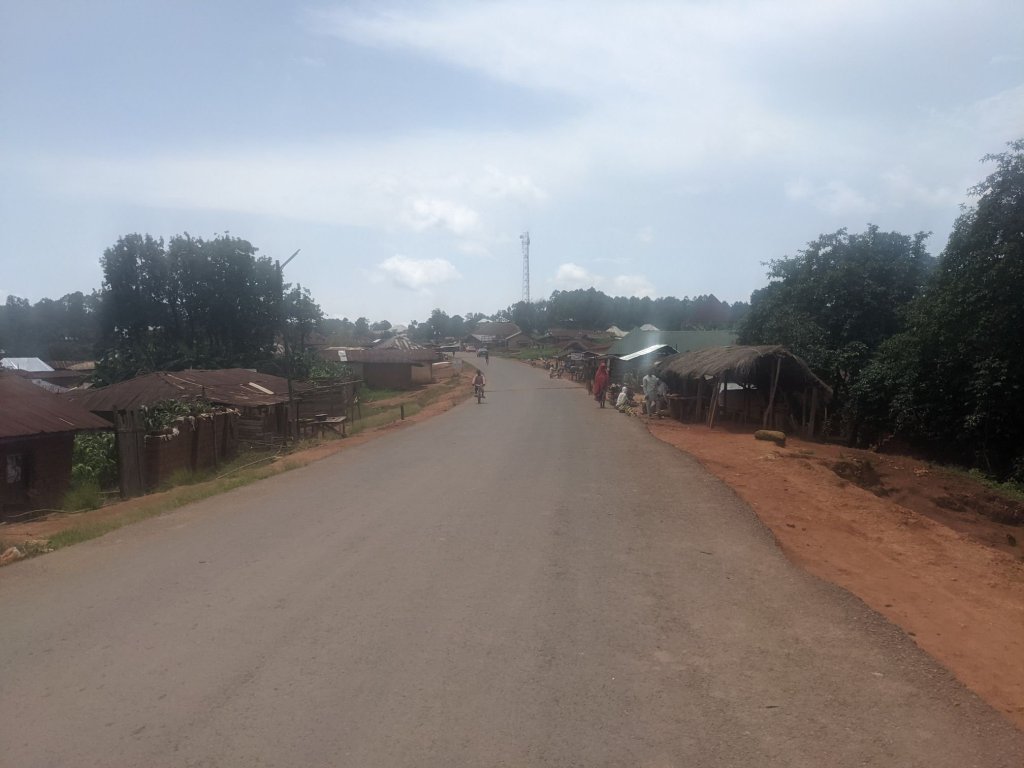
The scenery was similar to the previous day: beautiful mountains. I climbed a little higher to an elevation of about 1800m. It rained occasionally but never heavily nor for long.
I only rode for a few hours before stopping, quite early, at the town of Nguroje. I checked into a hotel and set about cleaning my bike in the hotel courtyard. My front derailleur had been jammed with mud for several days so I hadn’t been using the shifter. It had a lot of resistance so I took it apart to lubricate it.
When I put it back together, it wouldn’t work – the lever wouldn’t turn. There was a crack in the mechanism. Presumably when I took it apart and put it back together, the cracked part shifted, which blocked motion.
I lubricated it and left it overnight but it still wasn’t working. I adjusted the derailleur so that the chain was fixed in the middle chainring but could still reach all the gears at the back without rubbing. Using just the rear derailleur still gives quite a lot of range so I wasn’t too worried.
I continued cycling up and down the mountain tops for the first couple of hours. The road was badly potholed and often completely washed out.


I managed to avoid stopping at most checkpoints, but one immigration checkpoint did stop me. The officers there checked my passport and, interestingly, told me not to show my passport to anyone except immigration officials – not to police or soldiers.
Perhaps thanks to the bumpy ride, the front shifter started working again. I took it apart and found that a piece had broken off around the crack, which removed the impediment. Since I’d adjusted the derailleur, I couldn’t actually shift chainrings though; I decided to sort that out once I’d stopped.
After a while I reached the beginning of a long descent. Having started at an elevation of 1800m, this led me all the way down to 300m. Unfortunately the road was in a pretty poor state so it was slow going.

I reached the bottom of the descent and the road mostly levelled out and improved somewhat. It was now early in the afternoon and the air at low altitude felt extremely warm.

I passed through various small villages. People yell out and hiss at me quite a lot, though many of them are yelling things like “welcome!” Here I’m called “White Man,” “Nasara,” and a new word, something like “baturei.”
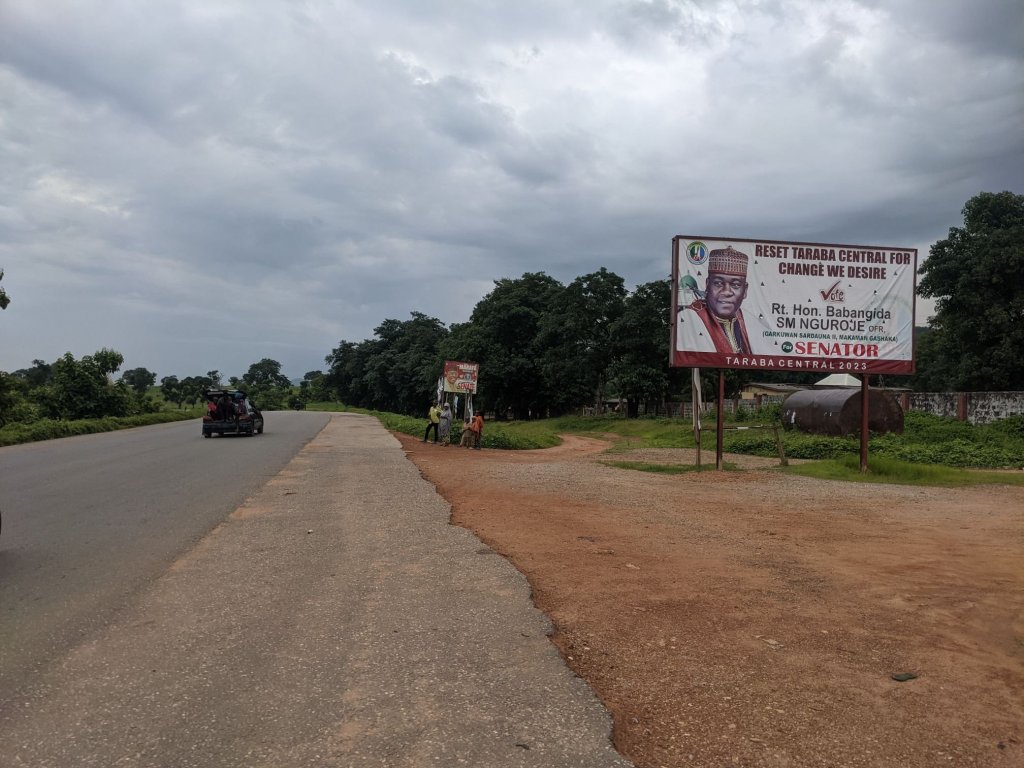
I had an early stop planned, at a town called Serti. Nigeria has a bit of a worse reputation than the other countries I’ve passed through, so I plan to stop well before dark and sleep in hotels. This place was a collection of bungalows run by the park service. I had a bungalow to myself for 2,000 Naira (£4).
Although it was hot, it initially wasn’t that humid, so it wasn’t unpleasant. I fell asleep around 8, reasonably comfortably. The humidity rose, though, and it turned into one of the more uncomfortable nights I’d had. I must have woken up ten times by midnight, soaked in sweat. When this happened I went and stood in a barrel of cold water, only to repeat the process shortly afterwards. After about 3 AM I managed to get some more consistent sleep but I wasn’t feeling great when I woke up.
I set off cycling on what was now a consistently good road. As I left Serti, I saw an unusual sight: a woman riding a motorcycle, and not as a passenger! It’s been a long time since I saw a woman operating a vehicle; most of Africa is very traditional with strict gender roles.
It rained for a couple of hours, mostly drizzle after one heavier patch. After that the clouds cleared and I could see views of the mountains. The road takes a long circuitous route around these mountains, so it was reasonably flat with only a few short climbs.


This area is very rural. It’s not empty – there are frequent hamlets and villages – but towns are few and far between. In this case, it’s about 100km from Serti to Bali, and about the same again to the next town, Mararaba. Since I’m trying to stay in hotels in Nigeria, I stopped in the early afternoon at Bali. I made sure to go to a hotel with AC this time!
Nigeria is unusual, even by African standards, in not having a functional public electricity system. Anyone who wants to use electricity must have a generator. There are many shops whose sole function is charging mobile phones for people, they could be charging a hundred phones at a time. Hotels tend to only run their generators at night, 7PM to midnight or so. They have the usual African relationship with time. For example, they’ll say that the generator will turn on at 6 – at 6.15, I ask, and it’ll be on soon. At 6.30 they head off to buy fuel for the generator…

The zip on my frame bag failed several weeks ago; I’d been keeping it closed with a cable tie. I finally got around to having it replaced. It’s not something I often remove from the bike – it looked quite strange without it!
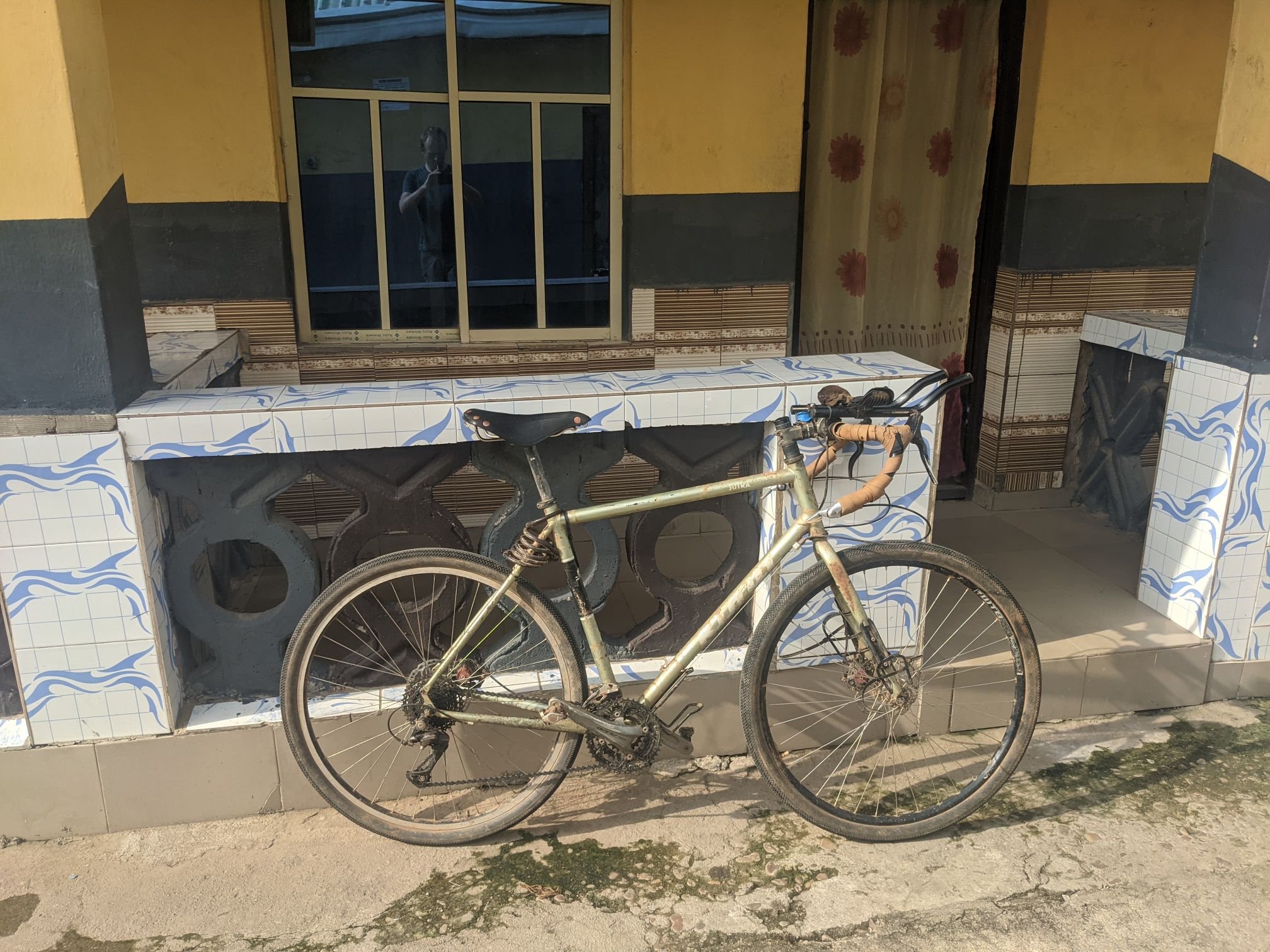

June 22: 84 km
June 23: 46 km
June 24: 96 km
June 25: 92 km
Dear Sam,
Colin advised that you got a case of malaria and headed home for recovery. Please let me know how
you are faring and what your future plans are. Cheers Jörg
LikeLike